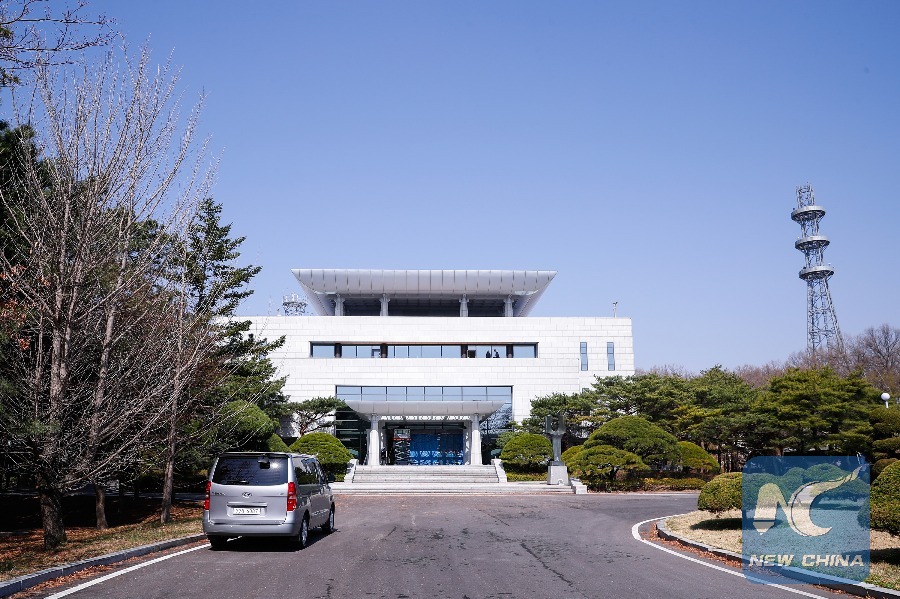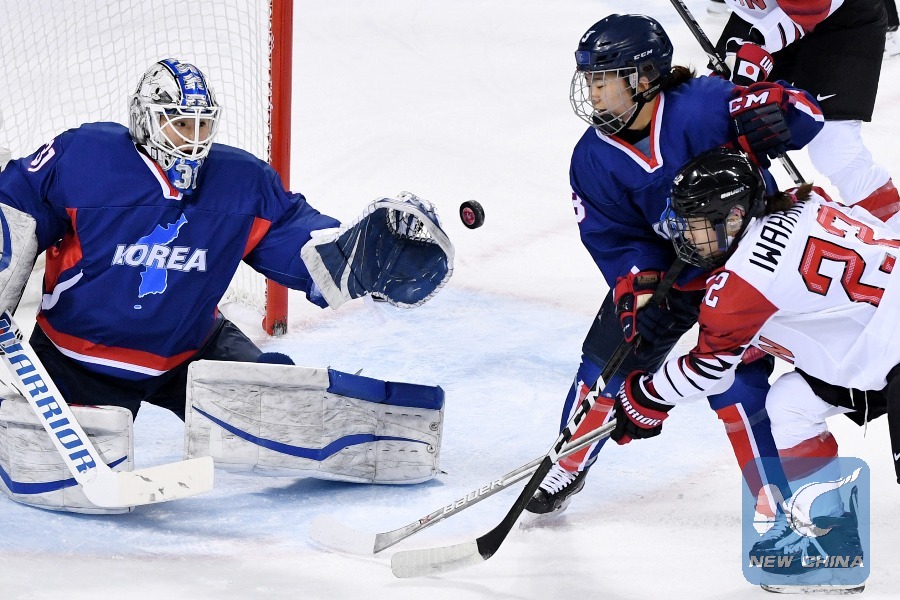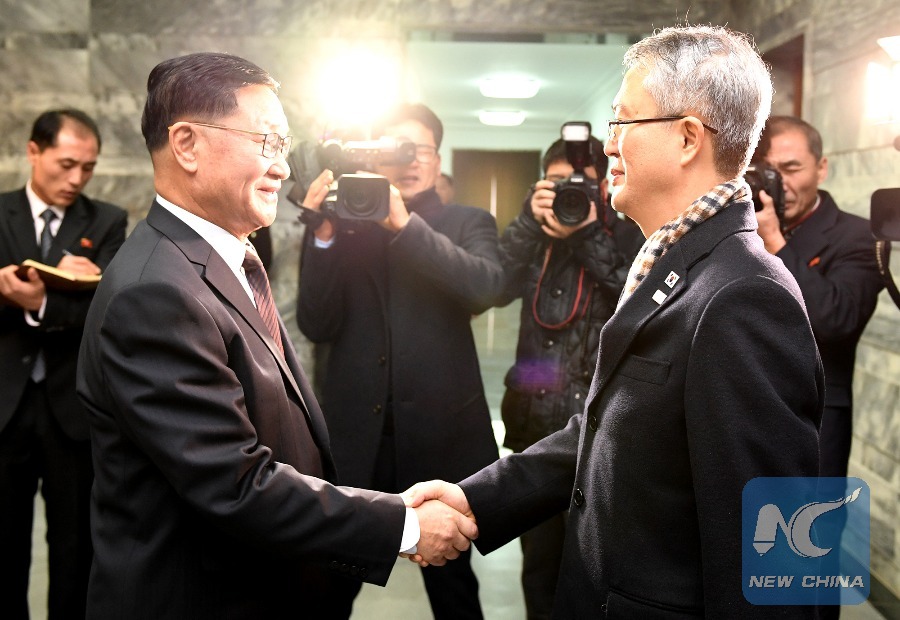
The Peace House, a South Korean building at the border village of Panmunjom in the demilitarized zone (DMZ), is seen in this picture taken on April 18, 2018. The summit between South Korean President Moon Jae-in and Kim Jong Un, top leader of the Democratic People's Republic of Korea (DPRK), is scheduled for April 27 at the Peace House. (Xinhua/Wang Jingqiang)
by Zhu Dongyang, Liu Chen, Matthew Rusling
WASHINGTON, April 25 (Xinhua) -- The upcoming meeting between top leaders of South Korea and the Democratic People's Republic of Korea (DPRK) could start the process of ending the current confrontation, rather than be an endpoint in itself, U.S. experts said.
A positive momentum around the Korean Peninsula has been built up in recent months ahead of the meeting between South Korean President Moon Jae-in and the DPRK's top leader Kim Jong Un that is slated for April 27 at the border village of Panmunjom.
WHAT MADE THE MEETING POSSIBLE?
Analysts said that the inter-Korean good faith resulting from the inter-Korean diplomacy around the PyeongChang Winter Olympics and Peninsula denuclearization has helped make the Moon-Kim meeting possible.
Pyongyang's statement on Saturday to halt its nuclear and long-range missile tests, together with the good faith efforts in recent months, has removed potential obstacles to dialogue and further enhanced mutual trust.
Dan Mahaffee, senior vice president and director of policy at the Center for the Study of the Presidency and Congress, told Xinhua that the push around the Olympics by the two top leaders has lowered tension on the Peninsula and led to the dialogue.
Troy Stangarone, senior director at the Korea Economic Institute, a Washington-based non-profit policy research institution, said that enormous credit should go to related countries like China "for creating the environment needed for the upcoming inter-Korean summit."
Without these continuous efforts to push for dialogue with the DPRK, the world "might not be where we are today," he added, explaining that Pyongyang's participation in the PyeongChang Olympics helped "shift the narrative of confrontation on the Korean Peninsula to one of dialogue."

Iwahara Tomomi (1st R) of Japan shoots against the unified team of the DPRK and South Korea during the preliminary match of women's ice hockey at the Pyeongchang 2018 Winter Olympic Games at the Kwandong Hockey Centre in Gangneung, South Korea, on Feb. 14, 2018.(Xinhua/Ju Huanzong)
Michael J. Mazarr, a senior political scientist at the U.S. RAND Corporation, told Xinhua that the primary factor that made the meeting possible was Kim's "apparent appetite for improved relations with the region and possibly the U.S., and thus by extension with South Korea."
"My own sense is that the 'maximum pressure' campaign may have affected the timing but didn't change the fundamentals of Kim's strategy," he added.
Mazarr noted that South Korea's appetite for better relations has also played a crucial role.
"Obviously, the Moon administration has taken a very different line than its predecessor, and the summit might not have happened without that change," Mazarr said.
WHAT CHALLENGES DOES THE MEETING FACE?
According to Mahaffee, efforts to continue lowering tensions and reversing specific tensions related to the DPRK's nuclear and missile programs are essential for the success of the meeting.

Photo provided by Korean Central News Agency (KCNA) on April 9, 2016 shows top leader of the Democratic People's Republic of Korea (DPRK) Kim Jong Un (front) recently overseeing the successful ground test of a heavy-lift engine of a new-type intercontinental ballistic rocket. (Xinhua/KCNA)
"How Kim and Moon work together will set a foundational tone headed into the proposed U.S.-DPRK meeting, but that will also have a broader range of factors to consider," he added.
In the eyes of Stangarone, the upcoming Kim-Moon meeting is "about starting a process rather than resolving issues."
"The most pressing areas for the two Koreas to begin discussions are on denuclearization and creating peace on the Korean Peninsula," he said.
There have been reports and indications that the two leaders would declare an end to the Korean War, he said. "But we should think about this more as beginning the process of ending the conflict that has taken place rather than an endpoint in itself."
He further noted that the most significant challenge to moving the process forward could come from Pyongyang's requests for sanctions relief or economic aid in exchange for abandoning its nuke storage.
But for RAND's Mazarr, the single key issue of the Kim-Moon meeting will be the precise shape of the denuclearization component and "whether there's a deal to be had there."
The good news is that all parties concerned are open to a big geopolitical and diplomatic settlement of the Peninsula issue.

Lee Woo-sung(front, R), head of South Korean delegation, shakes hands with Kwon Hook Bong(front, L), head of the Democratic People's Republic of Korea (DPRK) delegation, at the truce village of Panmunjom, Jan. 15, 2018. (Xinhua)
"The question is whether the U.S. will be able to live with something short of immediate, complete, verifiable disarmament, and what exactly it conveys to South Korea before the inter-Korean meeting," said Mazarr.
HOW WILL THE MEETING DEFINE FUTURE?
Stangarone told Xinhua that the Kim-Moon meeting's influence on the inter-Korean relations might be "subtle" initially.
"With sanctions likely to remain in place for a while," the DPRK and South Korea will "need to be creative in improving inter-Korean relations," he explained.
"The most pressing goal for the summit will be creating an environment conducive to the U.S.(-DPRK) summit," he said.
As for Mazarr, the most important influence of the meeting -- if the two leaders agree to end it with an agreed roadmap on the nuclear issue and a set of larger initiatives to surround it -- will be the setting of a very specific context for the meeting between Kim and U.S. President Donald Trump.
"I would not expect Seoul to do anything that surprises the U.S., but we'll have to see," he said.
Experts added that the meeting might even create the space for dramatic conventional arms reductions, a real boost for global disarmament.

